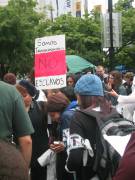Foreign Temporary Workers
==> For recent news, please visit Migrant Worker updates.
==> For Template Labour Resolutions in support of (Im)migrant Workers, please click here.
SOLIDARITY WITH TEMPORARY FOREIGN WORKERS
Statement by No One is Illegal-Vancouver, supported by Justicia for Migrant Workers BC.
“Expressions such as … “foreigner”… and so on, denoting certain types of lesser or negative identities, are in actuality congealed violence or relations of dominationâ€- Himani Bannerji
 The number of foreign workers in B.C. has doubled over the past three years, and in the past few months the issue of migrant labour has been contested on several fronts: RAV line construction, the Golden Ears Bridge, and Windsor Manor nursing home. The British Columbia and Yukon Territory Building and Construction Trades Council is supporting 60 temporary foreign workers employed for the Canada Line (RAV) construction who were paid less than $5 per hour and were required to work 54-66 hours per week with no overtime pay. Golden Ears Bridge Project contractor, Bilfinger Berger, is seeking to bring 345 foreign workers, but their application is being opposed by Ironworkers and the B.C. Federation of Labour on the basis that there are “Canadian workers for the job.†Finally the B.C. Government and Services Employees Union (BCGEU) is fighting the firing of 70 employees at Windsor Manor in Kelowna, where management is replacing them with foreign workers.
The number of foreign workers in B.C. has doubled over the past three years, and in the past few months the issue of migrant labour has been contested on several fronts: RAV line construction, the Golden Ears Bridge, and Windsor Manor nursing home. The British Columbia and Yukon Territory Building and Construction Trades Council is supporting 60 temporary foreign workers employed for the Canada Line (RAV) construction who were paid less than $5 per hour and were required to work 54-66 hours per week with no overtime pay. Golden Ears Bridge Project contractor, Bilfinger Berger, is seeking to bring 345 foreign workers, but their application is being opposed by Ironworkers and the B.C. Federation of Labour on the basis that there are “Canadian workers for the job.†Finally the B.C. Government and Services Employees Union (BCGEU) is fighting the firing of 70 employees at Windsor Manor in Kelowna, where management is replacing them with foreign workers.
There has certainly been tangible solidarity with local unions and migrant workers in the past several months with courageous drives for unionization, strike votes, legal challenges, and calls for permanent status for migrant workers. However at the same time, the labour sector’s drive to “protect Canadian jobs†and “Canadians first policy†reveals the ways in which ‘foreign migration’ is essentially viewed as a threat to organized labour. Such rhetoric pits Canadian-based workers against migrant workers. It has been well-documented that this power of nationalism, particularly as an ideology of exclusion, has been a useful mechanism to destroy solidarity between global labour rights struggles.
The push for expansion of Canada’s Temporary Foreign Worker Program has largely come from employers’ organizations and business lobbies. However, the exploitation of migrant workers as a source of cheap labour is only made possible through state and government regulations. Notions of “Canadian-ness†maintain the power of the state to define the ideological ground of who belongs and who does not. As written by Nandita Sharma, “the social organization of those categorized as non-immigrants works to legitimize the differentiation of rights and entitlements by legalizing the indentureship of people classified as migrant workers.†The legal classification of workers as “temporary foreign workers†suggest that they are not “Canadianâ€, are not working alongside “Canadiansâ€, and are in someway working in opposition to “Canadian†workers.
The most well-known historical example is the experience of Chinese railway workers in BC. After risking death and starvation on the boat trip from China, the estimated 17,000 Chinese workers who came to Canada from 1881-1884 were met with dangerous working conditions and racism by fellow workers upon their arrival. Chinese coal miners earned $1 a day compared to the $2.50 earned by white workers, and it is estimated that anywhere from 800-3500 Chinese migrants died during the construction of the railway. In the late 1880s, the Knights of Labor organized local assemblies to argue against the employment of Chinese workers. In 1907, the Asiatic Exclusion League- which included trade unionists- called for immediate restrictions on Asian immigration in order to maintain a “white Canadaâ€, and in September 1907 major riots destroyed Chinatown and Japantown. More recently, the American Federation of Labor and Congress of Industrial Organizations (AFL-CIO) in the US went on record in favor of employer sanctions against undocumented migrants.
Despite its historic and continued discrimination against non-European immigrants, its prioritization of the “skilled†(i.e business-professional) economic immigrants, and public discourse around immigrants “stealing†jobs, the Canadian state is faced with a fundamental paradox: it needs migrant labour. Statistically there are more people admitted to Canada under Temporary Employment Authorizations (238,093 in 2004) than the number of permanent residents (235,708 in 2004). This need for cheap, exploitable labour has been a driving force since colonization, and continues to inform Canada’s rationale for its guest worker program.
 While the government insists that migrant workers are treated fairly, migrant workers have documented experiences of isolation, discrimination, fear, exploitation, and limited access to social services. Seasonal employment programs have a high turnover rate and no accountability for ensuring minimum wages, basic employment standards, or the right to unionize. The typical migrant worker experience includes earning less than minimum wage, dangerous working conditions, and working 10-12 hours per day- often seven days a week- without overtime pay. Most importantly, their temporary status makes them vulnerable to abuse and exploitation, as any assertion of their rights leads not only to contract termination but also deportation. Therefore, access to citizenship is a tool of the labour market that fuels multi-million dollar industries.
While the government insists that migrant workers are treated fairly, migrant workers have documented experiences of isolation, discrimination, fear, exploitation, and limited access to social services. Seasonal employment programs have a high turnover rate and no accountability for ensuring minimum wages, basic employment standards, or the right to unionize. The typical migrant worker experience includes earning less than minimum wage, dangerous working conditions, and working 10-12 hours per day- often seven days a week- without overtime pay. Most importantly, their temporary status makes them vulnerable to abuse and exploitation, as any assertion of their rights leads not only to contract termination but also deportation. Therefore, access to citizenship is a tool of the labour market that fuels multi-million dollar industries.
Labour mobility is a basic characteristic of capitalism, and much of it has been coerced: indentured workers, slaves, prison labour, and (im)migrant workers. Government and public discourse fails to address root causes of forced migration. On the one hand, because of free trade policies- including Canadian free trade agreements- and structural adjustment programs, governments throughout the global South have been forced to adopt neoliberal policies that have restructured and privatized their land and services, resulting in the displacement of urban and rural workers and farmers. On the other hand, capital mobility has led corporations to create millions of low-wage jobs and to seek vulnerable workers to fill them, both in sweatshops in the global South and exploitable labour sectors in the global North. While governments support market integration and the free flow of capital, the same governments and their agreements seal borders to the free movement of people, fueling the hyper-exploitation of labour upon which the economy of the North is built.
(Im)migrant labour has historically been used to pull down workers wages globally, at the grave expense of the human rights of (im)migrant workers. Therefore a protectionist discourse seeking to “defend Canadian jobs†is reductionist and divisive as it ignores the reality that global capital and racist neocolonial policies affect the most vulnerable- racialized migrant workers and immigrant women- whose precarious labour ensures high profits for a small elite. Migrant workers are the refugees of globalization. Today, immigrant/refugee workers, including migrant workers, predominate as construction workers; as hazardous waste workers; as taxi drivers; as farmworkers; as domestic workers; as cooks and dishwashers; as home support workers; as janitors; and as garment workers.
 In the face of increasing capitalist globalization, the responsibility rests on us to not exclude those who are the most impacted, but to give voice to their struggles for dignity and justice. We must re-envision a labour movement based on a globalized solidarity that recognizes the expansionist nature of capital with its diverse sites of production and markets. We must unmask the legacy of colonialism and racism and place migrant workers at the center rather than the periphery of this movement.
In the face of increasing capitalist globalization, the responsibility rests on us to not exclude those who are the most impacted, but to give voice to their struggles for dignity and justice. We must re-envision a labour movement based on a globalized solidarity that recognizes the expansionist nature of capital with its diverse sites of production and markets. We must unmask the legacy of colonialism and racism and place migrant workers at the center rather than the periphery of this movement.
For further reading:
No way to treat a guest worker, Toronto Star April 2007
Guests Often Treated Badly, Georgia Straight Aug 2006
Migrant Workers in Canada: A review of the Canadian Seasonal Agricultural Workers Program, North South Institute 2004Â
Organizing and Mobilizing Filipino Migrant Women in Canada by Cecilia Diocson 2003
Close to Slavery: Report on US Guest worker programs by Southern Poverty Law Centre, 2007
Transient Servitude: The U.S. Guest Worker Program for Exploiting Mexican and Central American Workers by Richard Vogel Feb 2007
Globalization and the Struggle for Immigrant Rights in the United States by William Robinson
The Rise of Migrant Militancy by Immanuel Ness
Center for Labor Renewal Statement on Worker Migration, 2007



